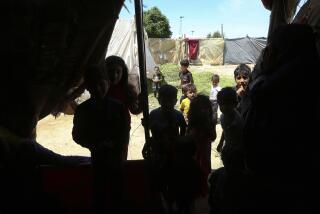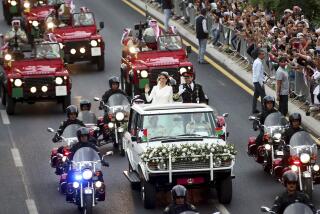Hussein Back in Jordan to Face Worst Crisis in Years
- Share via
AMMAN, Jordan — King Hussein returned to Jordan on Sunday to confront his most serious internal political crisis in nearly 20 years after riots over price increases spread across the kingdom last week.
The country remained calm Sunday, with no outbursts of violence reported since Friday night. However, police and troops were still out in force in Maan, Salt, Karak and several other towns and villages where the rioting, touched off by sharp price increases, erupted Tuesday night.
Hussein, who canceled a planned visit to Britain to fly home directly from his trip to the United States, conferred with his Cabinet ministers Sunday amid widespread expectations that he will address the nation within the next few days on economic and political reforms.
“His presence at home should initially have a calming effect, but the king will have to act soon to address the issues raised by the riots and to demonstrate his concern,” a senior Western diplomat said.
The rioting, in which at least eight people were killed and more than 100 injured, was the worst civil unrest in the tiny kingdom since Palestinian guerrillas were expelled from Jordan in 1970-1971 after heavy fighting with the Jordanian army.
While price increases, commodity shortages and other signs of the economic austerity gripping Jordan touched off the riots, the protests quickly assumed a more complex political profile. Calls to rescind the price increases escalated into demands for more democracy and for the ouster of the government of Prime Minister Zaid Rifai.
“The price increases were only the spark. What people . . . were saying in the end is that they want a better and more participatory government. They took to the streets to say this because without political parties, a free press or any other legitimate channels for dissent, violence was the only way to get the message across,” a Jordanian business executive, who is close to the royal family, said.
For King Hussein, the message was particularly disturbing because it came from the “Transjordanian” quarters of his kingdom, from the Bedouin and other native East Bank areas that traditionally have been the bedrock of the monarchy’s support.
For years now, Jordan’s extensive internal security apparatus has closely watched the Palestinians, who make up between 30% and 50% of the population.
But despite the temptation some analysts have felt to draw comparisons with the intifada, the Palestinian revolt against Israeli rule in the neighboring West Bank, no Palestinians were involved in the East Bank protests. That may explain why Amman, the mostly Palestinian-populated capital of Jordan, had no violence during the past week.
“This was a purely Transjordanian protest,” a Western diplomat noted. “The intifada doesn’t enter into it except insofar as watching the protests in the West Bank on television every night may have given the kids on the East Bank ideas of their own.”
As the protests spread up the spine of Jordan, the oft-recurring refrains heard on the streets were those demanding Rifai’s dismissal.
While the prime minister is widely held responsible for the deficit spending that helped to bring on Jordan’s current economic crisis, it also appears that he is being turned into a scapegoat.
“The demonstrators were expressing economic and political frustrations. They were saying they don’t want to be governed in this way,” said Fahed Fanek, a prominent East Bank businessman. “But no one wants to destroy Jordan, no one is against the monarchy. That is why everything was concentrated on the head of the prime minister and why the king was spared. Because the prime minister is not Jordan. The king is Jordan.”
Last week’s price increases--of 20% to 50% on a number of commodities--are part of an agreement recently reached with the International Monetary Fund to reschedule part of Jordan’s $6-billion foreign debt. This year’s IMF targets call for increasing government revenues by $67.25 million and cutting expenditures by $32.75 million.
A New Parliament
As for political reform, Hussein recently approved a law opening the way for the election of a new Parliament to replace the one that was dissolved last year when Jordan announced it was severing ties with the West Bank.
A number of Jordanian intellectuals interviewed over the last few days said they hoped that convulsions of the past week would persuade Hussein to loosen political and press restrictions.
“The lesson of last week is that there has to be some way of expressing an opinion in this country without throwing rocks or burning cars,” a prominent East Bank economist said.
NATION IN CRISIS
Jordan’s King Hussein met with his Cabinet to discuss rioting in several towns touched off by sharp price increases. At least eight were killed.
More to Read
Sign up for Essential California
The most important California stories and recommendations in your inbox every morning.
You may occasionally receive promotional content from the Los Angeles Times.













